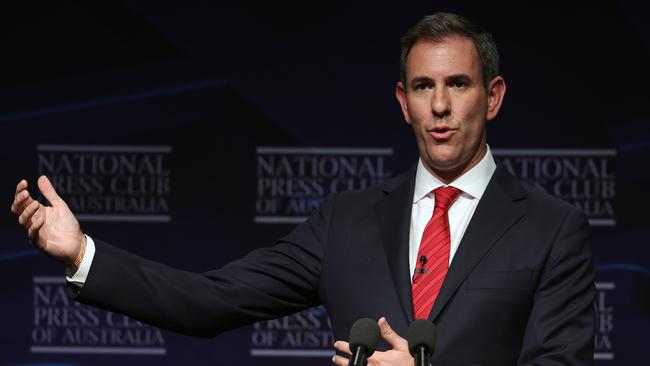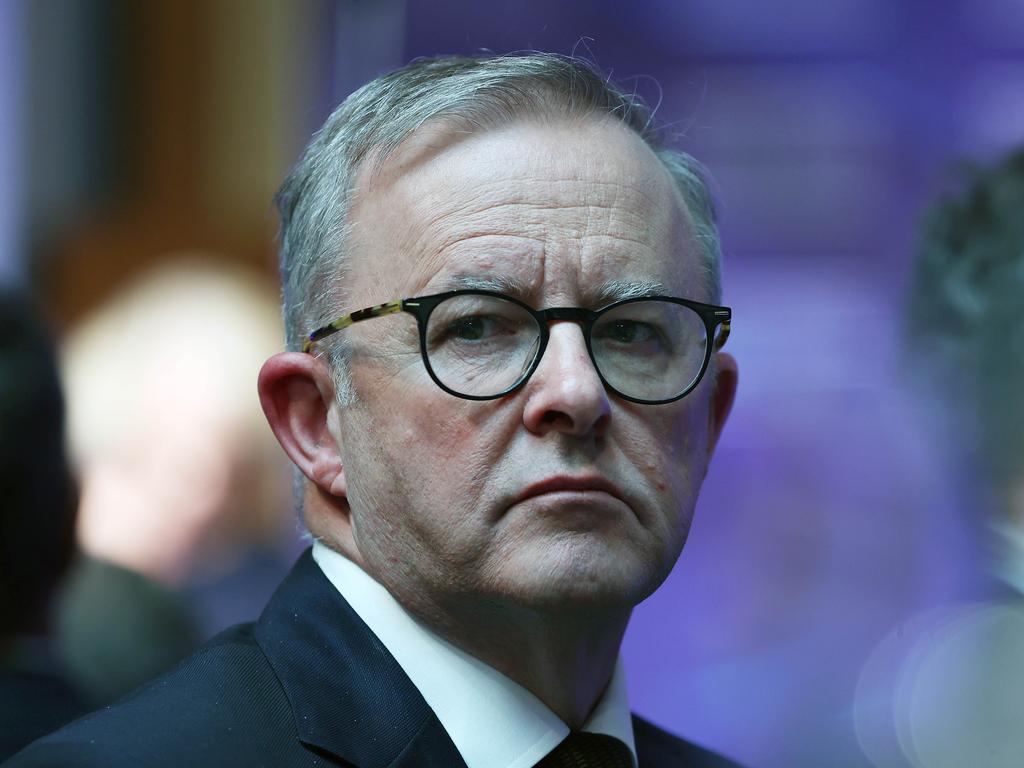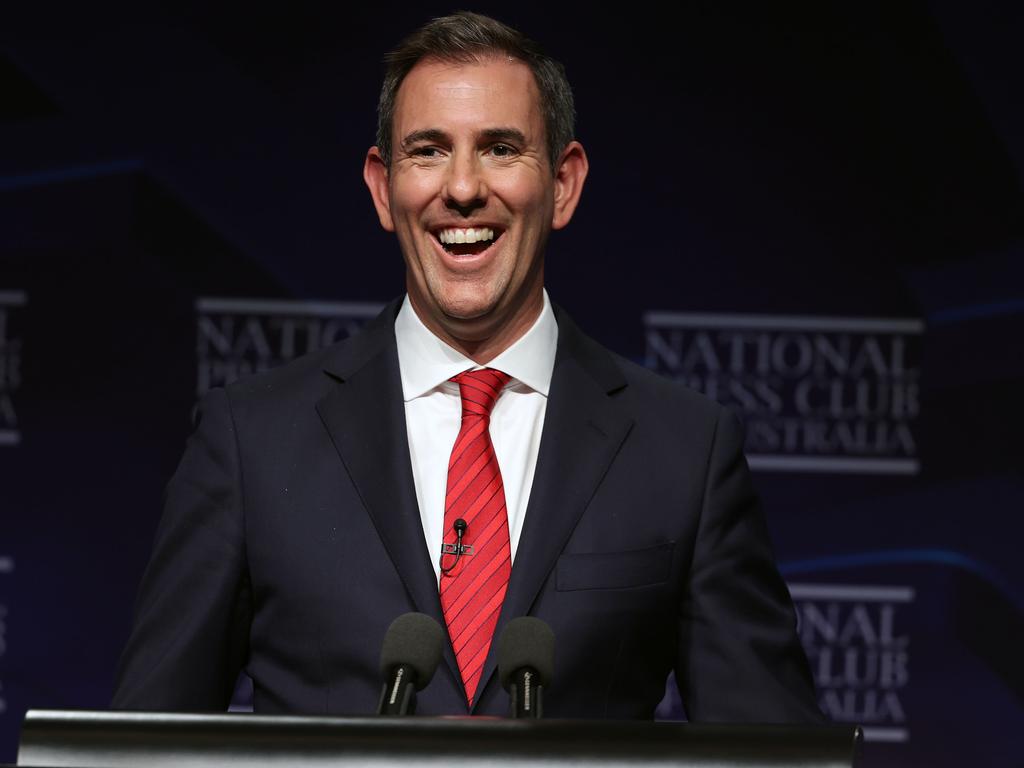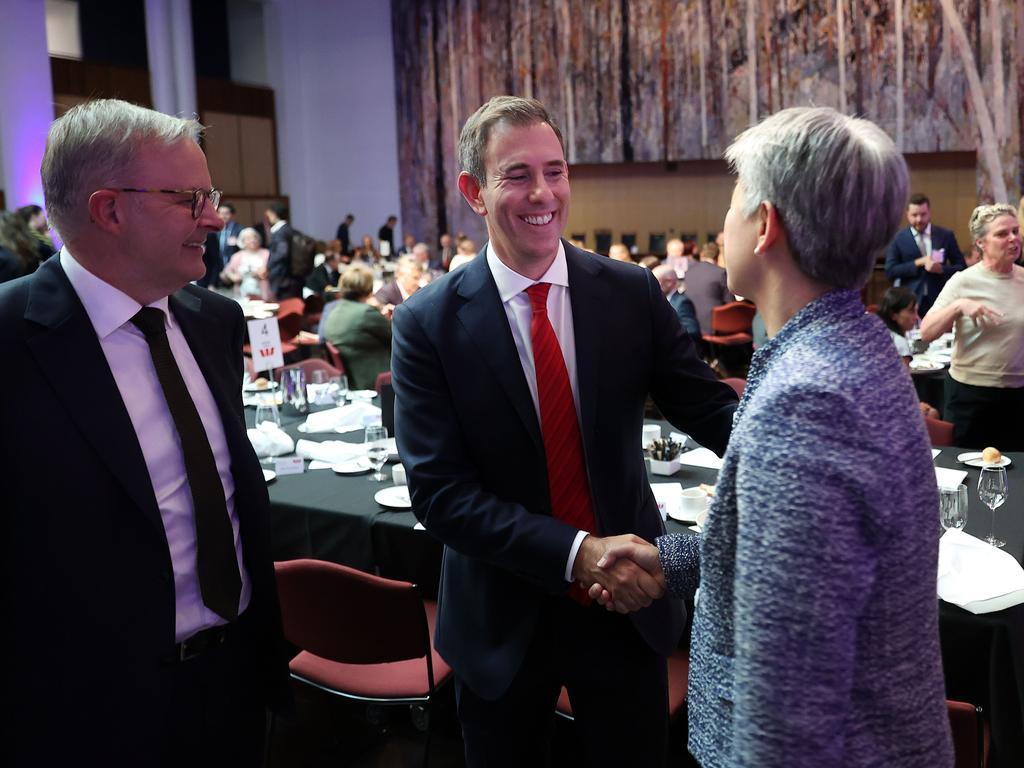Jim Chalmers rekindles Kevin Rudd’s spending mantra
Jim Chalmers has invoked Kevin Rudd’s infamous ‘this wasteful spending must stop’ declaration, vowing to go after more tax from big companies.

Labor’s treasurer-in-waiting Jim Chalmers has invoked Kevin Rudd’s infamous “this wasteful spending must stop” declaration against the Coalition, but insisted an Albanese government would not be held back on spending by the “GDP cap” the Coalition has set to limit overall taxation to a fraction of the size of the economy.
Despite the Kevin07 rhetoric and attacks on Morrison government spending, Dr Chalmers, who worked for Wayne Swan during the global financial crisis, said Labor would not reduce spending but improve the quality of spending and go after more tax from big companies operating in Australia.
Josh Frydenberg accused Labor of opening the door to tax increases by flagging the abolition of the government’s 23.9 per cent tax-to-GDP ratio after Dr Chalmbers told the National Press Club the opposition was “not attracted’’ to the cap.
Labor’s Treasury spokesman said he would slash spending on consultants and accounting firms to make budget savings, raising the likelihood that Labor would need to increase the size of the public service to fill the void
Dr Chalmers declined to commit to spending restraint if Anthony Albanese was victorious at the May election but flagged a new budget if Labor won office that would improve the quality of spending by abolishing government grant programs.
Accusing the government of wasting billions during the health crisis, Dr Chalmers evoked Mr Rudd’s 2007 attack on the Howard government.
“To paraphrase another Queenslander, I say this to Scott Morrison and Josh Frydenberg: ‘This reckless rorting and wasteful spending must stop’,” he said.
Dr Chalmers said Labor did not have any plans to raise taxes apart from asking multinationals to pay their “fair share” but would improve the bottom line over time through “better quality’’ spending to grow the economic pie, cracking down on Coalition “rorts”.
In his budget reply speech, Dr Chalmers conceded that, no matter who won the May election, interest rates and petrol would likely rise and cost-of-living measures such as the six-month cut to fuel excise would remain temporary.
His speech came as opposition legal affairs spokesman Mark Dreyfus conceded that the centrepiece of Mr Albanese’s budget reply — nurses on site in aged care facilities 24 hours a day — might have to be paused because of shortages.
But the Treasurer said Labor had “left the door wide open to taxing Australians more” by walking away from the Coalition’s tax-to-GDP ceiling. “Labor opposes a tax-to-GDP cap because at every opportunity they will look to tax you more,” Mr Frydenberg said. “Because Labor can’t manage money, they come after yours.”
Dr Chalmers, who helped frame some of the Rudd-Gillard government’s big-spending budgets as an adviser to Wayne Swan during the global financial crisis, said he had “learned lessons”.
“We’re not looking for a rerun. When we sit down and work out what the best agenda is for the future and for the economy, we’re not looking to retrace steps,’’ he said.
Dr Chalmers argued that the Coalition’s tax cap was “imposed for political reasons rather than good economic reasons” and that, as conditions evolved, Labor would “take advice from the Treasury and from elsewhere about the most appropriate settings”.
He speculated that Labor could find savings “in the low billions of dollars” by cutting the reliance of the federal bureaucracy on contractors and forcing the public service to do “more with less”. “When it comes to our fiscal strategy, you shouldn’t lightly dismiss getting value for money,” he said.
“The absence of that has been a big part of not having enough to show for the one trillion in debt in the last decade or so. It’s not a free for all. And it won’t ever be a free for all under us. So that task (budget repair) will be important. It will be ongoing. There will be opportunities for us to improve the quality of spending, whether the budget is expansionary or not.”
Dr Chalmers said the legacy of the Covid-19 pandemic fiscal response meant it was “hard to anticipate surpluses for some time”.
Scott Morrison warned that the opposition had wanted to increase the size of assistance during the pandemic and said the $8.5bn cost-of-living package in the budget was only possible because the government had ruled a line under emergency income support.
Speaking outside a petrol station in the Liberal-held Sydney seat of Banks to promote the halving of fuel excise in last week’s budget, the Prime Minister said Labor wanted to “keep on spending and spending and spending”.
“And what that would have meant is that we would not have been in a position to … provide that cost-of-living relief,” Mr Morrison said. “It would also have put our AAA credit rating at risk.”
Deloitte Access Economics partner Chris Richardson said a tax-to-GDP cap was important for discipline in government over time, but argued that there was nothing “magic” about the current limit.
“Our 23.9 per cent cap, calculated from the Howard government days, belonged to a period in which the world looked less dangerous that it does today,” Mr Richardson said.
“At some stage we need a combination of higher taxes and less spending to pay for the increased cost of defence and social security. We’re going to have to move the budget by about 2 per cent of national income through some combination of higher taxes and reduced spending.
“If they both move equally, that would add one percentage point to your tax-to-GDP cap, but still leave you with a substantial task of winding back spending.”
Dr Chalmers said the opposition’s $2.5bn aged care plan would require tens of thousands of extra nurses, as he outlined Labor’s plan to provide hundreds of thousands of fee-free TAFE places “to address the skills shortages acting as a handbrake on our economy”.
“We do need more nurses. Where there are areas of substantial skills shortages, we need to deal with that,” he said. “And that’s one reason why one of our biggest emphasises, one of our biggest commitments, has been around skills training.”
His speech came after Mr Dreyfus said on Monday that Labor might have to pause its landmark aged-care election promise to have nurses on site at aged-care facilities 24 hours a day, seven days a week.
Dr Chalmers said his position on the fuel excise cut was that it would end after six months.







To join the conversation, please log in. Don't have an account? Register
Join the conversation, you are commenting as Logout